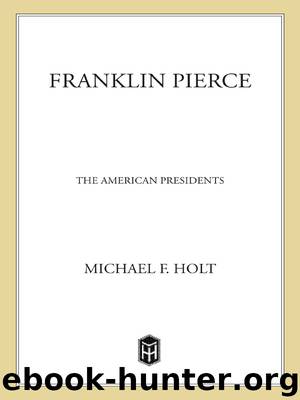Franklin Pierce by Michael F. Holt

Author:Michael F. Holt
Language: eng
Format: epub
ISBN: 978-0-805-08719-2
Publisher: Henry Holt and Co.
Signing off on the Kansas-Nebraska bill, which the administration’s newspaper in Washington quickly made clear was now a measure that all loyal Democrats were expected to support, was the biggest mistake of Franklin Pierce’s political career. Why, numerous historians have asked, did he do it? One reason most likely concerned the foreign policy on which Pierce believed the historical reputation of his presidency would rest. Gadsden’s treaty and the still uncompleted reciprocity treaty with Canada required Senate ratification, and the four members of the F-Street Mess who were pressing him to go along with the Nebraska bill had the power to deep-six those treaties should he buck them. James M. Mason, after all, chaired the Senate’s foreign relations committee.
Alternatively, some historians point to Pierce’s allegedly craven disposition to seek southern approval. Douglas and Pierce himself were the only northern Democrats at that Sunday meeting, and they were outnumbered by seven strong-willed southerners. Yet Pierce was not a weak man or easily intimidated. Nor, given his strong efforts to stop filibustering expeditions against Cuba that many southerners favored, did he always seek to please southerners.
A more likely possibility is that Douglas persuaded Pierce of the validity of the case he was already making in the Senate—namely, that the territorial provisions of the Compromise of 1850, to which the party’s 1852 platform was pledged, had been meant to apply to all territories, not just Utah and New Mexico. That was the rationale he used in the language he set out himself and he would state it again in a private letter in the summer of 1854.
Finally, Pierce’s most recent biographer argues that Pierce was motivated by his obsession with preserving the internal unity of the Democratic Party. According to this interpretation, had he refused to endorse the measure or—more dramatically—threatened to veto it should it reach his desk, he risked an almost certain breach with the most powerful members of the congressional wing of his own party. Pierce certainly had grounds for taking either course. Not only did the Democratic national platform of 1852 commit the party to upholding the compromise; it also pledged that the party would never again allow a matter involving slavery to come before Congress, a pledge Pierce had reiterated in his recent annual message. Yet, according to this view, preserving comity with congressional Democrats, rather than adhering to the party platform, was Pierce’s top priority.
My own guess is a variation on this theme. We simply do not know what was said at that meeting. But it seems likely to me that one of the arguments Douglas made reflected the warning he received in December. The Democratic Party would be “shivered to atoms” by internecine quarrels over patronage unless the Democrats developed some program that provoked opposition from the Whigs. Caleb Cushing, Pierce’s most influential cabinet adviser, had received a similar warning in July 1853, one he most likely passed on to the president. Nothing that Pierce had asked Congress to do in his annual message had the
Download
This site does not store any files on its server. We only index and link to content provided by other sites. Please contact the content providers to delete copyright contents if any and email us, we'll remove relevant links or contents immediately.
Fanny Burney by Claire Harman(25789)
Empire of the Sikhs by Patwant Singh(22176)
Out of India by Michael Foss(16313)
Leonardo da Vinci by Walter Isaacson(11912)
Small Great Things by Jodi Picoult(6101)
The Six Wives Of Henry VIII (WOMEN IN HISTORY) by Fraser Antonia(4795)
The Wind in My Hair by Masih Alinejad(4427)
The Lonely City by Olivia Laing(4122)
The Crown by Robert Lacey(4109)
A Higher Loyalty: Truth, Lies, and Leadership by James Comey(4038)
The Iron Duke by The Iron Duke(3642)
Millionaire: The Philanderer, Gambler, and Duelist Who Invented Modern Finance by Janet Gleeson(3573)
Sticky Fingers by Joe Hagan(3456)
Alive: The Story of the Andes Survivors by Piers Paul Read(3317)
Papillon (English) by Henri Charrière(3273)
Joan of Arc by Mary Gordon(3262)
Stalin by Stephen Kotkin(3089)
Aleister Crowley: The Biography by Tobias Churton(3024)
Ants Among Elephants by Sujatha Gidla(2927)
